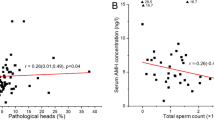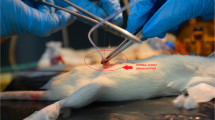Abstract
RECENT experiments have shown that in bulls injected with radioactive phosphate (phosphorus-32), 48–50 days elapse from the moment of injection to the time when radioactive phosphorus appears in the deoxyribonucleic acid of ejaculated spermatozoa1,2. This is the period of time required for the formation of spermatozoa in the testes and their passage through the epididymides. The purpose of the present study was to ascertain whether and to what extent this period can be influenced by varying the frequency of ejaculations.
This is a preview of subscription content, access via your institution
Access options
Subscribe to this journal
Receive 51 print issues and online access
$199.00 per year
only $3.90 per issue
Buy this article
- Purchase on Springer Link
- Instant access to full article PDF
Prices may be subject to local taxes which are calculated during checkout
Similar content being viewed by others
References
Dawson, R. M. C., Nature, 181, 1014 (1958).
Koefoed-Johnsen, H. H., Roy. Vet. and Agric. Coll., Sterility Res. Inst. Ann. Rep., 18 (Copenhagen, 1958).
Schmidt, G., and Thannhauser, S. J., J. Biol. Chem., 161, 83 (1945).
Ortavant, R., C.R. Soc. Biol., Paris, 148, 804 (1954).
Author information
Authors and Affiliations
Rights and permissions
About this article
Cite this article
KOEFOED-JOHNSEN, H. Influence of Ejaculation Frequency on the Time required for Sperm Formation and Epididymal Passage in the Bull. Nature 185, 49–50 (1960). https://doi.org/10.1038/185049a0
Issue Date:
DOI: https://doi.org/10.1038/185049a0
Comments
By submitting a comment you agree to abide by our Terms and Community Guidelines. If you find something abusive or that does not comply with our terms or guidelines please flag it as inappropriate.



